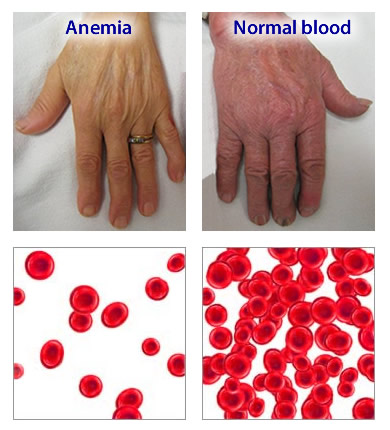What You Should Know About Anemia

Anemia is a condition in which there is a deficiency of red cells or of haemoglobin in the blood, resulting in pallor and weariness. Hemoglobin is a protein (metalloprotein) inside the red blood cells that contains iron and transports oxygen. Anemia is the most common disorder of the blood.
There are hundreds of types of anemia, which is divided into three groups:
Excessive blood loss anemia
Chronic bleeding (long-term bleeding) is often undetected for a long time. The patient gradually loses blood, which means a loss of red blood cells and hemoglobin. Acute bleeding (not long term), can also reduce red blood cell count. Excessive blood loss can be caused by:
- Stomach ulcers
- Hemorrhoids
- Inflammation of the stomach
- Stomach cancer or colon cancer
- Some medication that you take in high doses
- Childbirth, because it usually involves loss of blood
- Surgery
- Car accidents
- Blood donations
Excessive red blood cell destruction (hemolysis) anemia
A red blood cell usually lives for 110-120 days, after which it breaks down and is removed by the spleen. Some illnesses and conditions cause red blood cells to die too early. When this happens the bone marrow has to make more red blood cells than normal. If the bone marrow cannot keep up with the needed red cell production caused by their early deaths, the red blood cell count will start to fall, leading to hemolysis (anemia caused by excessive red blood cell destruction).
The following can cause hemolysis:
- Immune reactions
- Infections
- Some medications
- Poison
- Some medical procedures
Decreased or deficient red blood cell production anemia
In this type of anemia the body either does not produce enough red blood cells, or they may not work properly. People with this type of anemia may have:
- Sickle cell anemia, which is an inherited disorder which causes red blood cells to break down before the oxygen and nutrients can reach the vital organs.
- Lack of iron, which can be caused by poor diet, blood loss or the inability to absorb iron from food.
- Not enough vitamins
- Bone marrow problems
- Some conditions such as HIV/AIDS, arthritis etc
- Some medications
The following are symptoms of anemia:
- Fatigue- feeling tired all the time
- Lethargy – feeling lazy all the time
- Feeling you have shortness of breath
- Poor concentration levels
- Unpleasant irregular heart beats
- Sensitivity to cold temperatures
- Vomiting
- Blood in stools
- Pale skin
- Cold hands and feet
Should notice the above signs in might be advisable to seek medical attention as soon as you can.






